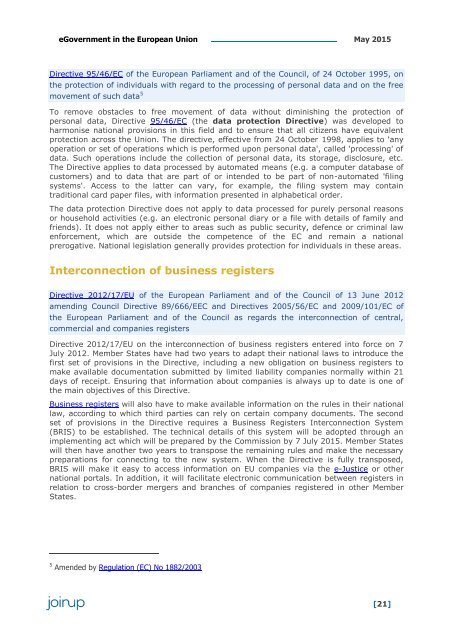P5ay8
P5ay8
P5ay8
You also want an ePaper? Increase the reach of your titles
YUMPU automatically turns print PDFs into web optimized ePapers that Google loves.
eGovernment in the European Union May 2015Directive 95/46/EC of the European Parliament and of the Council, of 24 October 1995, onthe protection of individuals with regard to the processing of personal data and on the freemovement of such data 5To remove obstacles to free movement of data without diminishing the protection ofpersonal data, Directive 95/46/EC (the data protection Directive) was developed toharmonise national provisions in this field and to ensure that all citizens have equivalentprotection across the Union. The directive, effective from 24 October 1998, applies to 'anyoperation or set of operations which is performed upon personal data', called 'processing' ofdata. Such operations include the collection of personal data, its storage, disclosure, etc.The Directive applies to data processed by automated means (e.g. a computer database ofcustomers) and to data that are part of or intended to be part of non-automated 'filingsystems'. Access to the latter can vary, for example, the filing system may containtraditional card paper files, with information presented in alphabetical order.The data protection Directive does not apply to data processed for purely personal reasonsor household activities (e.g. an electronic personal diary or a file with details of family andfriends). It does not apply either to areas such as public security, defence or criminal lawenforcement, which are outside the competence of the EC and remain a nationalprerogative. National legislation generally provides protection for individuals in these areas.Interconnection of business registersDirective 2012/17/EU of the European Parliament and of the Council of 13 June 2012amending Council Directive 89/666/EEC and Directives 2005/56/EC and 2009/101/EC ofthe European Parliament and of the Council as regards the interconnection of central,commercial and companies registersDirective 2012/17/EU on the interconnection of business registers entered into force on 7July 2012. Member States have had two years to adapt their national laws to introduce thefirst set of provisions in the Directive, including a new obligation on business registers tomake available documentation submitted by limited liability companies normally within 21days of receipt. Ensuring that information about companies is always up to date is one ofthe main objectives of this Directive.Business registers will also have to make available information on the rules in their nationallaw, according to which third parties can rely on certain company documents. The secondset of provisions in the Directive requires a Business Registers Interconnection System(BRIS) to be established. The technical details of this system will be adopted through animplementing act which will be prepared by the Commission by 7 July 2015. Member Stateswill then have another two years to transpose the remaining rules and make the necessarypreparations for connecting to the new system. When the Directive is fully transposed,BRIS will make it easy to access information on EU companies via the e-Justice or othernational portals. In addition, it will facilitate electronic communication between registers inrelation to cross-border mergers and branches of companies registered in other MemberStates.5 Amended by Regulation (EC) No 1882/2003[21]


